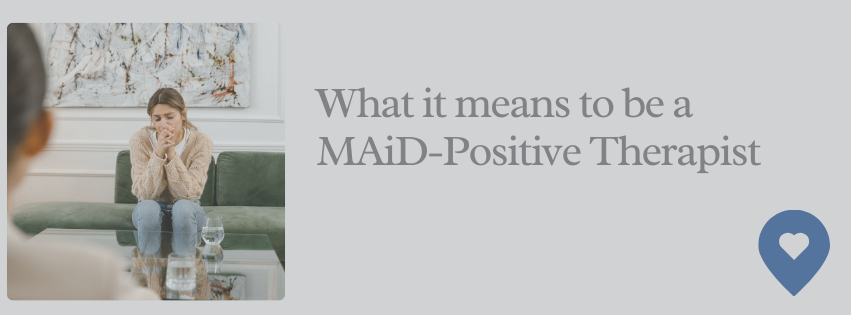|
What it Means to be a MAiD-Positive Therapist
Medical Assistance in Dying, or MAiD, has become increasingly popular in Canada as its availability increases, which means more people are talking about it, which means more people are talking about it in therapy. So, I decided it’s time to talk about what it means (and doesn’t mean) to be a MAiD-Positive Therapist. But first…. What is MAiD? MAiD is a process where eligible individuals request and receive assistance from medical professionals to end their life when they choose. This decision is deeply personal, and for many, it represents an assertion of control and dignity at the end of life. MAiD is highly regulated, with eligibility criteria for people seeking out a MAiD death, and regulations for the health care providers administering it. This blog post is not meant to cover the details of the process, or requirements, as those are continuing to develop. If you’d like up-to-date information on the process in Canada please check here: https://www.canada.ca/en/health-canada/services/health-services-benefits/medical-assistance-dying.html What Does it Mean to be MAiD-Positive? Being a MAiD-positive therapist means making space to talk about MAiD. It means understanding that death is part of life, and that people have thoughts, feelings, and wishes about death and dying; it means recognizing and respecting the legal right of individuals to make decisions about their own death. It means offering a non-judgmental, compassionate, and empathetic environment where clients can explore their thoughts, feelings, and wishes about the end of life. As a MAiD Positive Therapist, I will NEVER:
My Core Values of a MAiD-Positive Approach:
In Conclusion Being a MAiD-positive therapist means being open to all conversations about MAiD in a compassionate, curious, and non-judgemental way. It means respecting bodily autonomy and empowering clients to make their own choices. It means making space for clients to explore their own thoughts, beliefs, wishes, and values. It means understanding that dying is part of living and acknowledging the importance of helping people process choices about the end of their lives. By Joy Pekar (she/her) Registered Psychotherapist (Qualifying) Thank you to Renee Moor and her team at Journey Home for Empowered Living and Dying for coining the term “MAiD-Positive” and for supporting me as I elaborate on what it means to me. https://www.journeyhomesupport.com/
0 Comments
Leave a Reply. |
Site powered by Weebly. Managed by pair Networks

 RSS Feed
RSS Feed